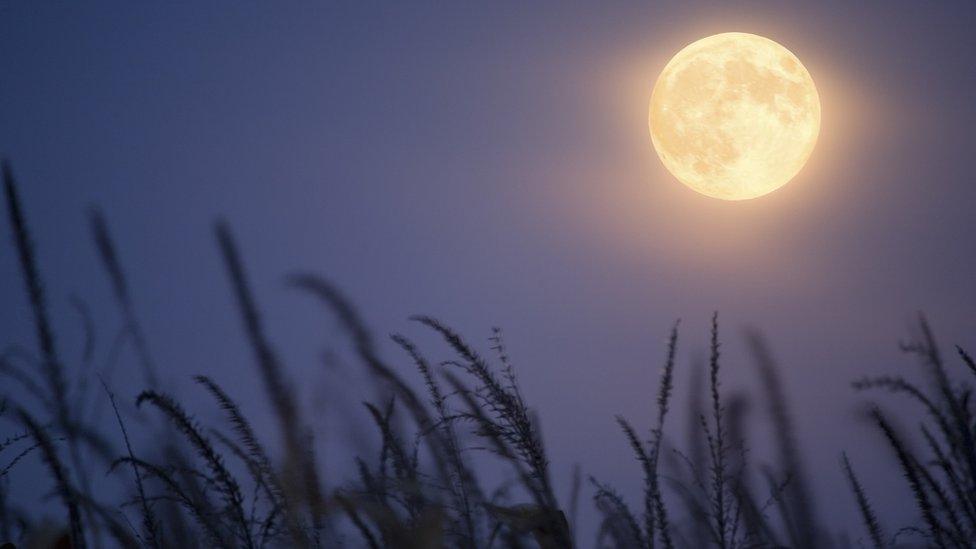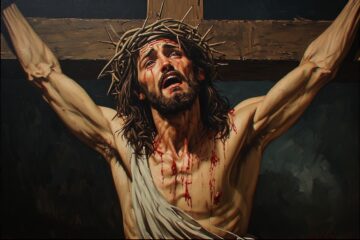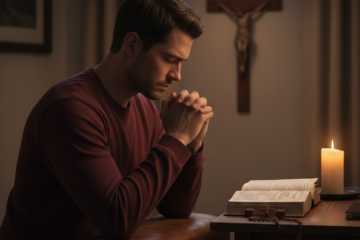It’s amazing what you think about as you cycling in the morning, going nowhere fast in the gym and today was no different. I write this on Tuesday 7th October 2025 and yesterday, as I was driving home there was a most amazing moon (I think it was a Harvest Super Moon) and I don’t know about you but I love gazing at the night sky, and the perfection of the moon. It gives me a sense of enormous wellbeing and, it helps me reflect on the glory of the creator.

This morning was no different, the moon (“That’s no moon!!” – let the reader understand) was still there in all its beauty and, as is my usual routine, I headed to the gym.
As I approached the 8th KM of the peloton ride I got to thinking about how Jesus is the “Good Shepherd” (I needed a distraction from the dull ache of regret that tends to set in about this time of the cardio) and that got me reflecting about the 23rd Psalm so here below is the summation of my consideration – enjoy!
1 The Lord is my shepherd; I shall not want.
2 He maketh me to lie down in green pastures: he leadeth me beside the still waters.
3 He restoreth my soul: he leadeth me in the paths of righteousness for his name’s sake.
4 Yea, though I walk through the valley of the shadow of death, I will fear no evil: for thou art with me; thy rod and thy staff they comfort me.
5 Thou preparest a table before me in the presence of mine enemies: thou anointest my head with oil; my cup runneth over.
6 Surely goodness and mercy shall follow me all the days of my life: and I will dwell in the house of the Lord for ever.
“The Lord is my shepherd; I shall not want.”
The opening is a confession of cosmic significance. The Hebrew name used here is Yahweh, the personal, covenantal name of the God of Israel. To say “Yahweh is my shepherd” is to make an intimate, relational claim in the very real sense of the word. In the ancient Near East, kings were often described as the shepherds of their people and so the psalmist immediately establishes a royal, yet deeply personal, bond. This of course finds its perfect fulfilment in Christ, who declares, “I am the good shepherd” (John 10:11). He is not merely a shepherd, but the Good Shepherd, the ultimate fulfilment of the divine shepherding promised by God through the prophets such as in Ezekiel 34:11-16, where God Himself says He will seek out His sheep and be their shepherd. The consequence, “I shall not want,” speaks of a comprehensive provision. In Christ, we confess that our every true need for forgiveness, for grace, for purpose, for eternal life is met totally in Him, who is the very bread of life who satisfies our deepest hunger (John 6:35).
“He maketh me to lie down in green pastures: he leadeth me beside the still waters.”
Here our divine Shepherd provides rest and refreshment in every sense of those words for the green pastures are not simply stumbled upon by the sheep; they are made for the sheep by the shepherd’s good and bountiful provision. The still, or “waters of quietness,” restores the soul from the very present agitation and fear of this world. This is a powerful prefiguration of the peace Christ gives. Our Lord does not offer temporary respite, a rest stop on the journey of life but an ontological peace. Not for the saved believer a simple “peace,” in the common usage of a temporary and circumstantial tranquillity for example a feeling of contentment when our enemies are quiet, when our bank account is sufficient, or when our children are healthy; these are fragile, entirely dependent on external factors which are frankly as changeable as the English weather but, a deeper, qualitative and infinite abiding rest for the soul. when we speak of an ontological peace, we are speaking of a peace that is not merely a feeling or an emotion, but a state of being, it is a peace that is woven into the very fabric of our reconciled relationship with God and is not dependent on what happens to us, but on what has been accomplished for us in the person and work of Jesus Christ.
This is the peace that the Apostle Paul describes when he writes, “Therefore, since we have been justified by faith, we have peace with God through our Lord Jesus Christ” (Romans 5:1). Notice the tense: “we have been justified,” and as a result, “we have peace.” This is not a future hope or a fleeting emotion; it is a present and permanent reality for those in Christ. It is a peace that has been objectively achieved. He invites us, “Come to me, all who labour and are heavy laden, and I will give you rest” (Matthew 11:28). The still waters also call to mind the waters of baptism, which are not turbulent but are the still, cleansing waters that give new life and restore the soul to its original grace. Augustine of Hippo, in his Expositions on the Psalms, saw in these pastures the spiritual nourishment of the Scriptures and the Church’s teaching, where the faithful soul finds its true sustenance.
“He restoreth my soul: he leadeth me in the paths of righteousness for his name’s sake.”
The restoration of one’s soul implies a prior state of weariness, sin, or despondency. The Good Shepherd actively seeks through His substitutionary death on the cross to restore, to reconcile us to God, a drawing of the sinner toward the divine, by the divine, through the divine. To find that which was lost and to heal what is broken. This is the ministry of Christ, who came “to seek and to save the lost” (Luke 19:10). The paths of righteousness are the ways of holiness and right living according to God’s command. Christ does not only forgive us our sins; He leads us in a new way of life. He is Himself “the way” (John 14:6), and to be led by Him is to walk in the path of righteousness. This leading is not for our merit alone, but “for his name’s sake.” The faithfulness of the Shepherd to His own character and covenant promises is the guarantee of our guidance. As J.I. Packer noted in his work Knowing God (1973), God’s commitment to His own glory is the foundation of our security.
a drawing of the sinner toward the divine, by the divine, through the divine.
“Yea, though I walk through the valley of the shadow of death, I will fear no evil: for thou art with me; thy rod and thy staff they comfort me.”
This is the beating heart of the psalm, where the pastoral scene darkens into the most profound theology. The “valley of the shadow of death” represents the ultimate peril, the deepest despair, and the reality of mortality itself. The believer’s hope is not that we avoid this valley, but that we walk through it and that we do so without fear because we do not walk alone. The very real presence of the Shepherd transforms the valley from one of final destination to one of journey point. This is a direct prophecy of Christ’s own descent into the valley of death, and His triumphant passage through it. By His cross and resurrection, He has conquered death stripping it of its ultimate sting (1 Corinthians 15:55) and His presence with us through the indwelling of the Holy Spirit is our very great comfort. The rod (a club for defence against predators) and the staff (a crook for guidance and rescue) are the instruments of the Shepherd’s care and they of course prefigure the cross of Christ, which is both our defence against the enemy of our souls and the instrument of our rescue, pulling us from the precipice of sin and despair and it can be no coincidence that the cross is made of two beams, the rod and the staff.

“Thou preparest a table before me in the presence of mine enemies: thou anointest my head with oil; my cup runneth over.”
Here the metaphor shifts subtly from the pastoral to the royal. The Shepherd becomes the Divine Host, preparing a banquet for His “sheep”, those of His “flock”. This is a staggering and humbling image of provision and honour in the midst of the conflict of life. The table prepared in the presence of enemies finds its ultimate meaning in the Holy Eucharist. At the Lord’s Table, Christ feeds us with His own body and blood, the bread of life and the cup of salvation, even as we remain in a world that is increasingly hostile to the faith. The anointing with oil signifies consecration, healing, and joy, pointing as it does to the Messianic title of “Christos”, the Anointed One. In our baptism and confirmation, we are anointed with chrism, sharing in His royal priesthood. The overflowing cup is a symbol of God’s superabundant grace, of a joy that cannot be contained, it is the “new wine” of the kingdom that Christ brings (Mark 2:22), the grace that is more than sufficient for us.
“Surely goodness and mercy shall follow me all the days of my life: and I will dwell in the house of the Lord for ever.”
The psalm concludes with a confident assertion of eternal security. The Hebrew word for “follow” here is powerful; it carries the sense of pursue or doggedly chase. We are not merely followed by a vague benevolence, but actively pursued by God’s covenant loyalty (“chesed”, mercy) and His inherent goodness, this is the relentless grace of God made manifest in Jesus Christ. The final line seals the promise, to dwell in the house of the Lord is to enjoy intimate, unending communion with God. This is no longer merely the Jerusalem Temple, but the eternal dwelling place of God, it is the fulfilment of Christ’s promise to prepare a place for us (John 14:2-3), and the vision of the New Jerusalem where “the throne of God and of the Lamb will be in it, and his servants will worship him” (Revelation 22:3).
The temporary guidance of the shepherd has culminated in eternal residence in the Father’s house.

In this most beloved and well known of psalms (even my mother, a devout atheist knew this one!), we can see the entire arc of the Christian life: from our initial confession of Christ as our Shepherd, through our daily sustenance in His grace, our comfort in the shadow of death, our nourishment at His table, and finally, our eternal homecoming.
It is a perfect map of the soul’s journey, with Christ, the Good Shepherd, as its beginning, its companion, and its end.
O Lord Jesus Christ, thou Good Shepherd of the sheep, who leads Your flock through the dark valleys of this world into the everlasting light of the Father’s house: I confess that in the shadows of our age, where the light of Your truth is so often scorned, my heart often grows faint and my steps seem uncertain.
Grant, I beseech You, the grace to feel the sure comfort of both Your correction and Your guidance, and to know with a certainty that transcends all fear, that Your goodness and Your mercy will continue to pursue me even here.
Amidst the clamour of hatred for Your holy name, quiet my soul with the memory of green pastures and the foretaste of the heavenly banquet, where You have prepared a table for me in the presence of my enemies and those of Your church. Anoint me afresh with Your Holy Spirit, that my cup of gratitude may overflow, and grant me the courage to dwell in Your house, and to proclaim Your light, all the days of this pilgrim life, until I come to dwell there for ever.
Amen.



0 Comments